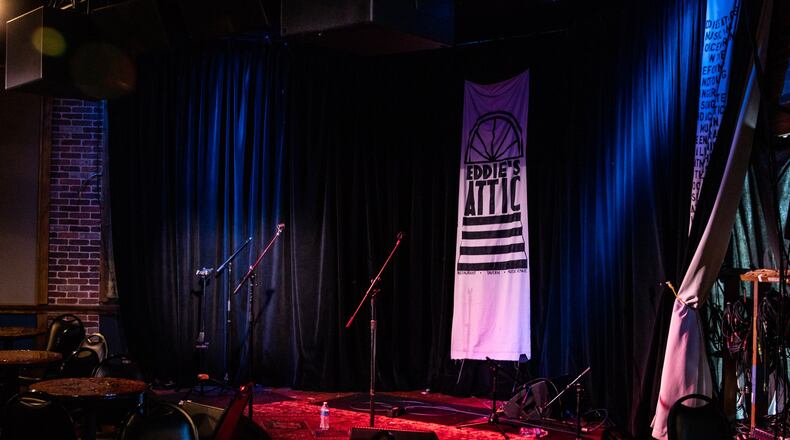Eddie Owen is frustrated.
The owner of Eddie Owen Presents at the Red Clay Music Foundry isn’t sure when the venue tucked inside the Duluth building that also contains a music school will be able to present live performances to an in-house audience.
“It’s tough to plan a budget for a show when you can only make 30 to 40 seats available,” he said of the 260-capacity music room.
His weariness with the effects that COVID-19 has wrought on the live music industry is echoed by his peers who handle other mid-sized independent venues across Atlanta — all of which have been closed since mid-March. (Don’t expect any large-scale arena, amphitheater or stadium show this year — if tours haven’t already been bumped to 2021 or canceled, they will be soon.)
“Right now, for me, it doesn’t seem feasible to open,” said Andrew Hingley, talent buyer for Eddie’s Attic, the 165-capacity Decatur music stalwart that Owen established in the early 1990s (it was sold in 2011). “My gut is to do one or two small things later in July and hope that by August we’re in a situation where we can go, ‘OK, we can put a few dozen people in here and they’re several feet apart.’ But it also comes down to, are people comfortable eating and drinking in there? And if everyone has masks on, I think the customer can get lost in the show and enjoy it, but I’m not sure the musicians will love looking out and seeing surgical masks. Do I want to do it? I do. But I’m scared of hurting the energy in the room. I want people to go back to Eddie’s and think, ‘Oh my God, I missed this.’ Not, ‘This doesn’t feel the same.’”
A few weeks ago, Gov. Brian Kemp announced a continuation of loosening business restrictions throughout the state and deemed that live performance venues could reopen starting July 1. The decree was accompanied by a list of 23 safety mandates, as well as social distancing requirements of six feet between people.
But just because the doors can open doesn't mean that most venues have the ability — or, as important, enough artists willing to play — to immediately welcome patrons.
Credit: Jon Whittaker
Credit: Jon Whittaker
“Let’s look at that list of criteria for operating and you can stop at No. 1, which is maintaining physical distance,” said Josh Antenucci, senior partner at promoter Rival Entertainment and event producer and production manager for Center Stage. “No matter the size of the venue, especially in the general admission world, it’s very difficult to imagine that we can reasonably create an entertainment environment that involves social distancing.”
Other directives on Kemp’s list include all workers wearing face coverings (except when eating or drinking); all individuals being screened upon entry; “contactless” practices for parking, ticket-taking, ticket purchasing, will call and security checks (“to the extent practicable”); additional concessions areas established to reduce lines; and physical barriers, such as Plexiglas, installed at ticket windows and other points of sale.
It’s a daunting commitment that has caused other Atlanta venues, including the Masquerade and Smith’s Olde Bar, to withhold the welcome mat.
“Many people don’t realize that live performance venues are very different from restaurants and retail. You can’t just open the doors and invite people in. Most events take months of scheduling and planning. Also, tours depend on there being dozens of viable cities to play, not just one or two, in order to be financially feasible,” said Greg Green, talent buyer at the Masquerade, who noted that all of the downtown venue’s summer shows are off the slate, with much of fall in the same status.
His hope is that the venue can ease back into business with one-off events and local artist shows — but the practicalities are still being studied.
One venue that is planning to appraise the consumer appetite for live music is City Winery. The Atlanta location expects to open in mid-July — shortly after its Nashville outpost relaunches — with "much reduced capacity" in its 300-seat performing space. Tickets for that first performance will be announced soon.
That the music room is equipped with movable tables and chairs allows for easier modification than most of the aforementioned venues, which either contain built-in seating or thrive as general admission gathering spots. Tables for two, four and six will be available, with a couple of eight-top options.
Jim Ethridge, marketing director for the Atlanta City Winery, said guests will be required to wear masks when not seated at their table.
"We ask that they have them on when entering the establishment, including the patio," he said. Those without masks will be provided with complimentary ones (the winery is also selling branded face masks on its website).
As for Atlanta’s other music havens, they will continue to grapple with how to safely edge toward reopening as they also combat treacherous financial challenges.
Many Atlanta venues have joined the National Independent Venue Association, which appealed to Congress with a #SaveOurStages campaign and requested federal assistance for their unique small businesses.
Recently, dozens of high-profile artists including Billy Joel, Lady Gaga, Cher and Robert Plant signed a support letter to Congress on behalf of NIVA.
But for the immediate future, Owen will rely on livestreamed shows from his music venue, as he did recently with folkies Banks & Shane (the adjoining Red Clay Foundry music school reopened June 1 and Owen is hopeful that a return to regular school in the fall will jump-start music lessons).
“We probably had 1,500 to 2,000 people watch the (Banks & Shane) show and we only seat 260, so that blew my mind,” he said. “We opened up the (virtual) tip jar and had 550 designated streams and damned if we didn’t make almost as much as we would at the door.”
Hingley is also exploring livestreams from Eddie’s Attic and an eventual soft return with only a limited number of table tickets sold (for about 60 people) and a handful of singles on the venue patio, where a stream would be played on monitors.
Center Stage’s Antenucci realizes that the plethora of local and regional talent might be ripe for one-off shows with limited capacity. But he’s also rooted in reality.
“A lot of us have considered what (Kemp’s executive) order means for us and it seems a unanimous consensus that it’s a welcome step forward,” he said. “But it does not in any way lead to any routine performances.”
About the Author
Keep Reading
The Latest
Featured





